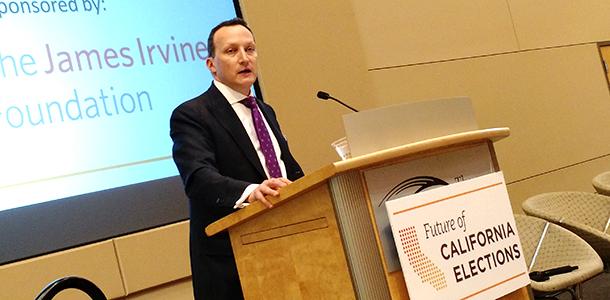
David Becker, executive director and co-found of the Center for Election Innovation & Research, speaks at the 2017 Future of California Elections Conference (Photo Credit: John Guenther/CA Fwd)
As election officials and reformers gathered for an annual event in Los Angeles, the goal of upgrading California's elections took on special significance this year in the face of a crisis of confidence in democracy itself.
At the Future of California Elections Conference yesterday, the focus remained on improving the mechanics of elections administration with an eye toward the threat of politics gumming up the works.
“We have to be ready protect our advances and make sure elections, stay free, fair, open, accessible,” said Dora Rose, senior director for civic engagement at the League of Women Voters California.
Pushing back against talk about voter fraud and the movement of states enacting voting restrictions, California Secretary of State Alex Padilla kicked off the daylong event with county elections officials, voting experts, and accessibility advocates.
“How do we, yes, maintain the security and integrity of our elections, but do what we can to make it easier who are eligible to register to vote to be registered and make it easier for people who are registered to vote to actually a cast a ballot?” said Padilla. “It doesn't get more American and patriotic than that.”
At a time when political polarization and voting restriction legislative activity increased, the work of people at the FoCE event and across the country has continued a movement toward making voting easier and more accessible.
“But while this all was happening, good policy got made anyway in both blue and red states,” said David Becker, executive director of the Center for Election Innovation. “Policies that increased access, improved election integrity, saved money, and were more were more efficient and led to higher voter satisfaction.”
Arizona was the first to adopt online registration in 2002. At this point, there are now at least 34 states with some form of electronic registration and in 28 states have introduced bills in 2017 to adopt or expand automatic registration, according to the Brennan Center.
Much of the reforms are being driven simply because voters are changing how they vote. Orange County Registrar Neal Kelley said 1.1 million vote-by-mail ballots were sent out in the recent election and voting by mail in his county was trending toward 95 percent of ballots cast.
“So there's a lot of important data behind that that leads to the idea that voters are looking for a choice, and they're looking for voting on their terms,” said Kelley.
The theme of this year's FoCE event was building momentum and addressed topics like getting more California youth to vote and improving language and disability access. But the most prominent subject was the California Voter's Choice Act, approved last year by the Legislature and Governor Brown.
The voting model allowed by the law would let counties move to a “vote centers,” which would replace polling places. These early voting sites would be staffed by county employees, facilitate same-day registration, and be open for 10 days before Election Day — a big change in the way California has voted in the past.
If adopted by a county, every voter would receive a ballot in the mail under the new system. They could then fill out the ballot, mail it in or drop it off at any vote center in their county up to the 10 days prior to election. The system is intended to make the voting experience smoother and more convenient, plus result in cost savings.
“Early voters are happy voters because they pick the time and place they vote,” said Nevada's Clark County registrar Joseph Gloria, who presented photos of voters in his county lined up to cast their ballot in malls, grocery stores and mobile trailers.
The pressing need to boost turnout also weighed heavily on conversations. Becker said that it's estimated that more than 50 million voters may sit out the 2018 elections. But he noted there's actually opportunity in the fact that people surveyed after elections will create justifications for not voting and yet the amount of people who claim they are registered is higher than it actually is.
“They know they should be voting,” said Becker. “Whether it's consciously or subconsciously, there's a civic lever inside of them that could be moved.”
Becker also spoke of being caught up in the news cycle when President Trump incorrectly claimed that Becker's 2012 research on voter registration issues showed evidence of vast voter fraud. He added the allegations and possibility of increasing public distrust in elections makes talking about election integrity and legitimate problems a “challenging tightrope to walk.”
With a contentious 2016 election and charged political environment as a backdrop, many panelists stressed the need for coalitions like FoCE which allow government officials, nonprofits and advocates to collaborate on reform work at the state and local level, where effective reform is more likely compared to the national level.
“We have an important moment to build off of right now — that people are paying attention to civics and government, an important moment and an opportunity for us to capture and leverage and re-energize people getting involved, not just in registering to vote and not just in voting, but being involved in their communities,” said Padilla.
The Future of California Elections Conference was sponsored by the James Irvine Foundation.

